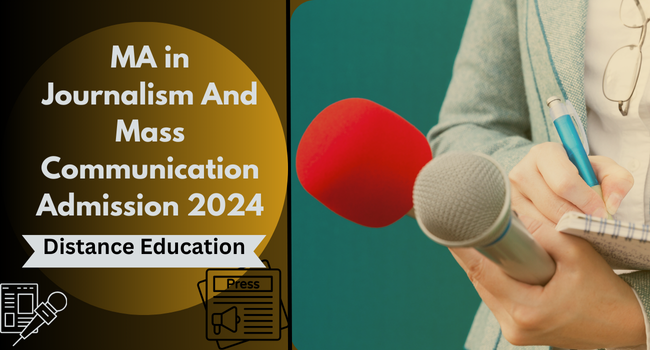MA Journalism and Mass Communication Distance Education Admission 2025-26: A 2-year Master of Arts (MA) in Journalism and Mass Communication is a specialized postgraduate course which is offered through several distance mode universities. Candidates who pursue this program get theoretical and practical knowledge and skills about reporting, editing, radio communication, creative writing, etc. Any candidate who holds a graduation degree in Science, Arts, or Commerce stream with a minimum of 40% marks from a recognized university.
Multiple universities like Chandigarh University are currently inviting candidates to apply for MA in Journalism and Mass Communication distance education courses. Admission for the 2025-26 session will close on an expected date of 12 April 2025. Selection for enrollment to this program is based on eligible marks obtained in a bachelor’s degree in specialization like journalism, mass communication, media studies, or communication studies. MA in JMC distance education course fee varies for different universities and it may range between INR 15000 to INR 38000.
MA Journalism & Mass Communication Distance Education: Quick Facts
- Approval: Broadcast Regulatory Authority of India is an Indian statutory body that regulates MA Journalism and Mass Communication course. According to the UGC-DEB guidelines, it is offered through distance mode.
- Eligibility: Those who have a degree in BA in JMC or an equivalent from a recognized university.
- Course Duration: MA in JMC course can be completed in 2 years which is divided into 4 semesters.
- Application Deadline: Applicants can enroll themselves online till 12 October 2025*.
- Career Opportunities: After completing MA in Journalism and Mass Communication students can join career options like journalism, advertising, content creation, social media, media consultant and others.
MA in JMC Distance Education: Highlights
| Full-Form | Master of Arts in Journalism and Mass Communication |
| Course Level | Postgradaute |
| Duration | 2 year |
| Examination Type | Semester-based |
| Eligibility | A bachelor’s degree in a relevant stream. |
| Age Limit | No specific age limit |
| Admission Process | Merit based |
| Course Fees | INR 15000 to INR 38000 |
| Job Position | Content writer, Event manager, Social media manager, Film Maker |
| Average salary offered | INR 3.8 LPA to INR 8.6 LPA |
MA Journalism and Mass Communication Eligibility
Applicants who want to hold a Master’s degree in Journalism and Mass Communication shall need to meet admission requirements set by some of the universities offering this program. Those applying for this program are encouraged to go through the prospectus of a particular institute they are enrolling at. Admission is offered based on merit. For more information regarding admission candidates shall visit the official website of a selected university. Following is the common key eligibility criteria of MA Journalism and Mass Communication distance education course:
- Seats are allotted to candidates who hold a bachelor’s degree in Journalism and Mass Communication or an equivalent from a reputed university.
- At least 40% marks is required in a graduate level examination to be selected for admission.
- Applicants must be of at least 17 years of age at the time of taking admission and there is no maximum age restriction for enrollment.
Documents Required for BA Distance Education
- Educational documents: 10th and 12th mark sheets and certificates (original scanned copies)
- Passport Size Photographs: Recent colour photographs with a white background
- Identity Proof: Valid government ID (Aadhar Card/Driving License/PAN Card)
- Category Certificate: SC/ST/OBC certificate if applicable, for fee benefits
MA Journalism and Mass Communication Course Syllabus
An academic syllabus of Master of Arts in Journalism and Mass Communication consist of both theoretical and practical subjects. It’s important to note that specific syllabus may vary from different university to university. A wide range of topics are covered in this program such as Media and Communication Theories, Journalism Ethics and Laws, News Reporting and Writing, Broadcast Journalism, Digital Journalism, etc. Given below is the list of syllabus of each semester of MA in JMC program:
| SEMESTER I | SEMESTER II |
| Conceptualising Communication | News Reporting |
| Media Laws | News Set Up |
| Media Ethics | Specialized Reporting and Beats |
| Media Organizations | News Reporting (Practical) |
| History of Press | Specialized Reporting (Practical) |
| SEMESTER III | SEMESTER IV |
| Editing | Radio |
| News Desk | Television |
| Editing Process | Radio Practical |
| Editing (Practical) | Television Practical |
| Editing Practical Layout | Script Writing (Practical) |
| Specialized Reporting (Practical) |
MA Journalism and Mass Communication FAQ
Q1: What was the last date for IGNOU MA Journalism and Mass Communication admission 2025?
Ans: The last date to get enrolled at IGNOU MA Journalism and Mass Communication was 15 November 2025 for the academic year 2025-25.
Q2: What are the topics covered through IGNOU MA Journalism and Mass Communication Syllabus?
Ans: A wide range of topics are covered through the syllabus of MA Journalism and Mass Communication. Some of the topics are Introduction to mass communication, Broadcast journalism, Media laws, Communication studies, Public Relations, Writing and editing for print media, etc.
Q3: What are the MA Journalism and Mass Communication fees for all distance learning universities?
Ans: The fees for MA Journalism and Mass Communication distance education range between INR 15K to 38K.
Q4: Name some of the universities that offer Masters in Mass Communication and Journalism in India through distance education?
Ans: Some of the universities that offer master’s degree in Journalism and Mass Communication are Acharya Nagarjuna University, Yogi Vemana University, KKHSOU, Maharshi Dayanand University, and many more.
Q5: What are the Masters in Journalism and Mass Communication eligibility criteria for most universities?
Ans: The basic eligibility criteria for admission to MA Journalism and Mass Communication is to have a BJMC degree or any equivalent from a recognized university with at least 40% marks.








